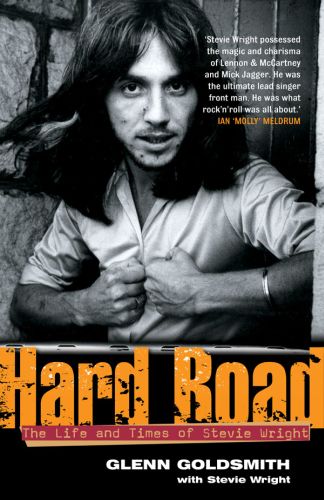The Life and Times of Stevie Wright

Glenn Goldsmith, with Stevie Wright
Published by Random House Australia
ISBN 1-774051-261-8
RRP: AU$22.95
| OUR RATING: |




|
I'm all for fredeom of speech, but at the remove of a couple of years, it's increasingly hard to understand why "Sorry", Jack Marx's prurient, self-obsessed book about Stevie Wright, was ever allowed to appear in print. Although it was disingenuously marketed as a biography, it was in fact a malignant, ill-intentioned attempt at gonzo journalism which told us nothing new about its subject, preferring to shamelessly exploit the seamiest aspects of Wright's personality and predicment.
Fortunately, we now have Glenn Goldsmith's new authorised biography, which has just about every desirable characteristic one could wish for in such a book. Goldsmith knows Wright personally, backed him on stage for two years, and has his full cooperation for the book.
He has been able to amass all the important facts about Stevie's story -- and some great anecdotes -- and he tells that story comprehensively, clearly and sympathetically, but without overt partiality. He examines the darker side of Stevie's life with admirable clarity; he neither resiles from nor over-dramatises the horror of Stevie's catastrophic decline into heroin and alcohol abuse, and he makes no bones about the fact that in many respects Stevie was his own worst enemy.
There's no doubting that Stevie Wright's is indeed a cautionary tale. He flew high, fell far and crashed hard; underlying Goldsmith's book is a palpable sense of the tragic loss of potential that this entailed. Stevie was one of our greatest pop performers, and was also a gifted pop writer who could have done so much more. But he was also legendarily hyperactive (today he would probably be disgnosed as ADHD) and in the absence of any proper family or peer-group support much of his adult life was lived out in the selfish, headlong pursuit of a chemical replacement for the stratospheric rush that rock stardom provided. As Glenn reminds us on several occasions, it's easy to overlook the fact that "Little" Stevie was barely sixteen when he became a national pop star, and was only twenty-one when he found himself cut adrift, virtually penniless and supposedly washed up after the split of the Easybeats in 1970.
Since the mid-70s it has been has been regularly predicted that Stevie Wright was destined to end up as just another celebrity drug casualty. Yet in spite of the dreadful battering his body and mind have endured, Stevie has survived, and has somehow managed to rally around and come back time after time. He is a survivor against terrible odds, and in that sense at least, he is a hero. Wright's flaws are many and self-evident and Goldmsith does not attempt to disguise them, but he does not attempt to shamlessly exploit them as Marx did, and he also shows us the better sides of Stevie that helped to make him a star.
It's clear that Goldsmith has a lot of admiration and respect for Stevie, in spite of the faults, and he was fortunate to work with him while there was still some significant remnant of the old magic. And magic there was aplenty, as anyone will attest who saw the Easybeats in their heyday, or at their glorious 1986 reunion.
Stevie Wright deserves this book -- it's a fair, accurate and often compelling account, well structured and lucidly told. In glaring contrast to Marx's grotesque conceit, Goldsmith's personality does not intrude on the story. There are a couple of tiny factual errors, but these are very minor criticisms and overall it's a fine addition to the canon. There's a lot of fascinating information about Stevie's career during and after the Easybeats, but it's no mere trainspotting exercise, and it will certainly be welcomed by rock nerds and general readers alike.
One especially revealing feature of this book is Glenn's chilling account of the pivotal moment in Stevie's downward spiral -- his horrific subjection to so-called Deep Sleep Therapy at the infamous Chelmsford Private Hospital, which is about as cautionary a tale as anyone would want to read. It's a classic case of the cure being worse than the disease, and there's terrible irony in the fact that Stevie's desperate bid to beat his drug demons left him with more problems and more damage than before. It's another remarkable irony that the horrors of Deep Sleep Therapy were finally exposed mainly through the the efforts of the oft-reviled Church of Scientology. Sadly, those revelations came too late for the hundreds of unfortunates who died during or after their spells in Chelmsford and the hundreds more like Stevie, whose lives have been permanently scarred by the experience.
Another praiseworthy feature is Glenn's acknowedgement of the women in Stevie's life, who cared for a troubled man against often insurmountable odds, and he is to be especially thanked for his low-key but obviously heartfelt praise for Stevie's heroic partner Fay, who has stuck by Stevie through the very lowest ebb of his life and who has been instrumental in helping him pull through.
Godlsmith also deserves praise for his even-handed treatment of those who have tried to exploit Stevie over the years -- most notably Jack Marx, who gets off far more lightly than he deserves. (Personally, I am all in favour of having him burned alive on a pile of his own books).
For anyone with an interest in Australian popular culture, "Hard Road" is a welcome and long-overdue addition to the literature, and after years of grimy, sensational headlines, it is rewarding to see one of our first and greatest rock stars finally being given the kind of treatment he deserves.
Angus & Robertson booksellers, or from any good bookstore.
Please email MILESAGO
if you have any comments or extra information to add to this page
Copyright © MILESAGO 2004
Please report any broken links to
webmaster@milesago.com